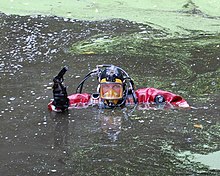North West Police Underwater Search and Marine Unit
This article needs additional citations for verification. (May 2012) |
The North West Police Underwater Search & Marine Unit are based in the North West of England, and deliver specialist underwater search, confined space searches and marine policing from the Scottish border to Mid-Wales.
Collaboration
[edit]The Unit is a collaboration between six police forces (Merseyside Police, Greater Manchester Police, Cheshire Constabulary, Cumbria Constabulary, Lancashire Constabulary and North Wales Police), with Officers from each Force being seconded to the Unit.[1][2][3]
All the officers on the unit are qualified commercial divers, and hold a range of boating and other specialist qualifications, including confined space search techniques.
Because the unit also operates in Wales, "Heddlu", the Welsh word for police can also be seen displayed on some of the unit's boats and vehicles.
Role
[edit]

The tasks that the unit undertake, apart from being challenging, are both wide and varied. As well as being involved in the recovery of bodies from water, security and evidential searches are a regular activity. This will include the searching of ponds, weirs, reservoirs, rivers, streams, canals, docks, lakes, quarries, with some of these at altitude.
The unit also provides a police presence up to 12 nautical miles (22 km; 14 mi) out to sea. They police parts of the coastline of the Irish Sea.
The unit is available to forces during times of flooding, such as those seen in Cumbria in 2009.[4]
As well as performing the duties across the North West region for the member police forces, they regularly work alongside other UK law enforcement agencies, such HM Customs, UK Visas and Immigration and the Royal Navy.
The unit carries out drug enforcement operations such as ship hull searches.
History
[edit]In the 1970s, Merseyside Police, Greater Manchester Police and Cheshire Constabulary joined together to form the Joint Underwater Search Unit.
In 1987, a police diver from North Wales Police joined the Unit.
In the 1970s, Cumbria and Lancashire Constabularies had a combined Underwater Search Team.
In 2003, both police diving teams merged to become the North West Underwater Search Unit.
From that time to present, the unit has continued to develop not only in diving techniques but also by developing a marine policing function.
Equipment
[edit]


In order to maximise their efficiency and capability, the unit utilise specialist electronic search equipment, including side-scan sonar, scanning sonar, remotely operated vehicle (ROV).
The unit has a close working partnership with the Home Office Centre for Applied Science and Technology, and takes part in research and trials of specialist equipment.
For deployments and operations, the unit previously used a 13-metre (43 ft) police launch, called Consortium, which was replaced in December 2017 with a 10.2-metre (33 ft) metre catamaran, called The Cormorant, after Consortium was damaged during an accident with a tug boat and a tanker. They also use several high powered Rigid Inflatable Boats, a 7.2-metre (24 ft) Cheetah Marine catamaran,[5] and a number of inflatables for use on water that is restricted or difficult to access.
In support of dive operations the unit use a purpose built truck, which integrates with the technology used by the team and provides an essential land based facility to the divers.
References
[edit]- ^ Merseyside Police. "Underwater Search & Marine Unit". Retrieved 14 June 2012.
- ^ Cheshire Constabulary. "Underwater Search & Marine Unit". Retrieved 14 June 2012.
- ^ Greater Manchester Police. "North West Regional Underwater Search and Marine Unit". Retrieved 14 June 2012.
- ^ "Cumbrian Floods 2009". BBC News Cumbria. 7 December 2009. Retrieved 14 June 2012.
- ^ Cheshire Police (23 May 2012). "7.2m versatile diveboat for Cheshire Police Department". Cheetah Marine Catamarans. Retrieved 14 June 2012.
